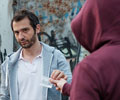The Maldives, known as a holiday haven for the rich and famous, is grappling with a growing drug abuse problem among its young people including pre-teens.
Around 20 percent of the island nation's residents under the age of 15 are using banned substances, according to the National Narcotics Control Bureau.Bored and restless, youngsters, who comprise more than 40 percent of the population of 300,000, are increasingly turning to drugs, health workers say.
"It's a tragic social crisis," said Aminath Hamzoon, a trainee peer educator who works with youngsters trying to kick drug habits.
"The problem has escalated due to boredom, peer pressure, poor employment prospects and overcrowding on the islands," she said at this after-care peer support training camp on Vilingili Island close to the capital Male.
There are an estimated 5,000 users in densely crowded Male, with the island's narcotics bureau reporting cases of children as young as nine experimenting with heroin.
The UN Children's Fund, UNICEF, estimates the average age is 12 for first time drug users in the Maldives.
Advertisement
The problem flourishes despite a growing tourism industry which has made the Maldives, with a population of 300,000 mainly Sunni Muslims, the richest nation in South Asia. Per capita income is 2,674 dollars.
Advertisement
"The problem is so acute that every Maldivian family has at least one member who is a drug addict. Drugs have wiped off about two generations from our country," said human rights activist Jennifer Latheef.
She said the government's harsh approach to drugs has filled Maldives' jails, but failed to curb the number of addicts.
"Street crime is on the rise, as addicts look for means to supplement their addiction," Latheef said.
The opposition Islamic Democratic Party is now calling for tougher sentences for dealers and users and is pushing the government to execute drug smugglers.
But recovering addict Ahamed Shah, 28, who has spent time in a state-run rehabilitation clinic, said authorities need to take a compassionate approach.
Recovering addicts are stigmatised, making employment difficult, Shah said.
And counsellors like Ashfaq Latheef, attached to an after-care drug centre called Journey, said more than 80 percent of recovering addicts relapse after rehabilitation.
"Maldives is such a small place, everyone knows each other. It's hard to avoid friends who lead you back into drugs," said Ashfaq, a former addict who like many others started with cannabis oil and moved onto heroin.
An increased number of heroin users has also raised concerns about the spread of deadly diseases. UNICEF's Maskall said addicts who were switching from smoking to injecting drugs risked contracting and transmitting HIV/AIDS, whose cases remain low in number in the Maldives.
In 2005, Italian footballer and UNICEF Ambassador Paolo Maldini kicked-off a nationwide football tournament, titled Unity Cup, advocating a drug-free and healthy lifestyle for young people.
Promoted by the government, the local football association and UNICEF, the tournament is in its second year with organisers hoping more youngsters will turn to sport and similar activities rather than drugs.
Source-AFP
LIN/C











